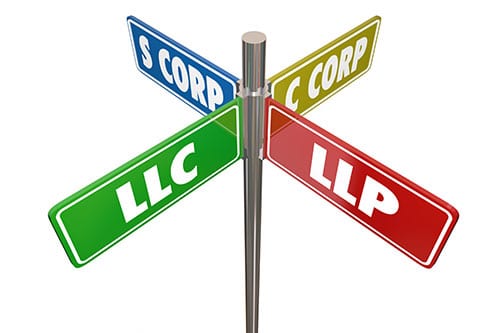Choosing an Entity for Your Business
Becoming an entrepreneur is a big step in a person’s life, with accompanying challenges and great benefits. From an asset protection standpoint, it adds additional needs to prevent outside attacks on the assets that you are creating. One of the key steps and decisions is the formation of an entity and deciding which version of an entity will provide the best benefits and protections. While various partnership forms could also be considered, the primary choices are three: C-Corporations, S-Corporations, and Limited Liability Companies (LLC’s). Each of these comes with a primary factor that involves taxation. In this article, we will look at those main decision-making factors to hopefully simplify the decision.
If you are a typical new start-up business, it may take a little while to build the business income to the point where taxation would vary greatly from one type of business to another. It is possible to choose one version of an entity, and at a later date, choose to go with a different type of entity, but this creates its own complexity, and most people would prefer to stick with the same version. This makes choosing an entity into a long-term decision.
The original version of a business entity in the United States is now called a C-Corporation and was designed for larger businesses with multiple shareholders. The “little guy” businesses at that time did not form entities, they operated as sole proprietors, and their business did not provide them with many tax advantages or deductions. Over time, the understanding of business structure protections and tax benefits began to trickle down to small business after the introduction of income tax in the 1940’s. More and more C-Corporations were formed. The issue for most small businesses with C-Corporations is called “double taxation.” In a C-Corporation, the corporation is taxed for income. Most business owners then become employees of the Corporation to be paid, and that income is then taxable as personal income. In a small business, this can be a challenging tax burden. Most small businesses do not opt to become C-Corporations.
The second type of entity is the S-Corporation and allows business owners a “pass-through” arrangement for taxes where owners pay taxes on the business income, in the form of income tax plus self-employment tax. In an S-Corporation, owners can be employees of their business. By doing so, they will not be obligated to the 15.2% Self Employment tax on the portion of the business income that comprises their salary. This can be a tax advantage, but S-Corporations require that the owner of the company be paid a reasonable salary for their work, and new businesses often do not produce enough income to adequately compensate the owners as a salary. Plus, the corporation will need to be set up to do payroll. Many accountants would say that S-Corporations would not be a good choice as start-up organizations for these reasons.
The third and most popular entity form for new businesses is the Limited Liability Company, or LLC. This is a more recently formed entity structure and was designed for new or small businesses. In many ways, an LLC operates and is taxed like a sole proprietorship. The government considers the owners to be self-employed, so they pay income tax and also self-employment tax. The LLC structure, though, satisfies the requirements for a business entity, and the advantages of an entity are that it provides a longer list of tax deductions than a sole proprietorship, and creates separation between personal assets and business assets. Since these are the two greatest advantages of owning a business entity, many small or start-up businesses opt to use the LLC structure as their entity.
While this overview is intended to provide a few reasons for consideration of various entities, the real decision should be made by working with a licensed tax accountant or attorney, as they are the only ones who are legally allowed to provide legal or financial advice. It is possible to change to a different entity structure after first adopting another, but the process is complicated and sometimes costly in a variety of ways, so most business owners choose a structure that they can live with for an extended time period, accepting the advantages as well as the disadvantages. To quote an old tv program called “Kung Fu”, our advice is “Choose Wisely, Grasshopper.”
_____________________________________
i https://www.legalzoom.com/articles/s-corp-vs-llc from the legal zoom website.

